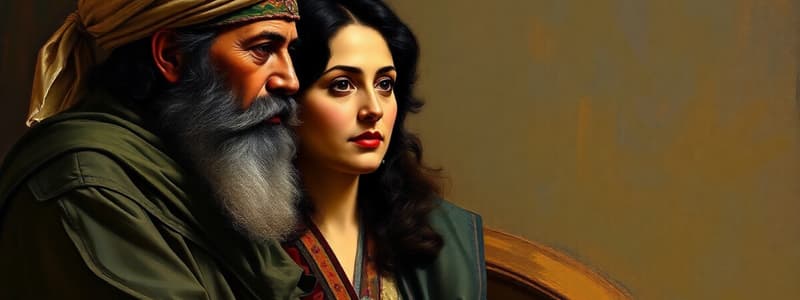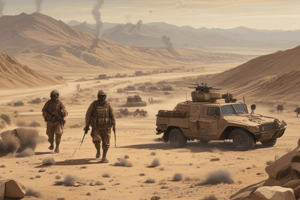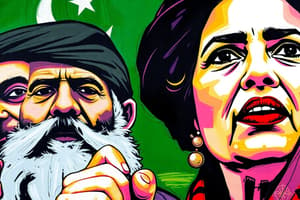Podcast
Questions and Answers
Ziauddin Yousafzai's letter to the newspaper, while intended to protect schoolchildren, inadvertently amplified their vulnerability to the Taliban. This outcome primarily highlights the complex interplay between:
Ziauddin Yousafzai's letter to the newspaper, while intended to protect schoolchildren, inadvertently amplified their vulnerability to the Taliban. This outcome primarily highlights the complex interplay between:
- parental courage and community support during crises.
- religious piety and political activism in conflict zones.
- public advocacy and personal safety in the face of extremism. (correct)
- traditional values and modern education in conservative societies.
The phrase 'You have put the first stone in standing water,' used to commend Ziauddin, metaphorically suggests:
The phrase 'You have put the first stone in standing water,' used to commend Ziauddin, metaphorically suggests:
- his action has stirred up hidden dangers that were previously dormant and peaceful.
- his action, though small, has created ripples of change and inspired others to act. (correct)
- his action is a foundational step towards constructing a more resilient and stable society.
- his action was initially disruptive, but will ultimately lead to clarity and progress.
Ziauddin's decision to change the boys' school uniform from 'Western' clothes to shalwar kamiz was primarily driven by:
Ziauddin's decision to change the boys' school uniform from 'Western' clothes to shalwar kamiz was primarily driven by:
- a practical assessment of immediate threats and prioritizing the physical safety of his students. (correct)
- a reflection of his evolving personal views on cultural identity and resistance against Western influence.
- a strategic move to subtly undermine the Taliban's authority by adopting local attire.
- a desire to appease the Taliban's cultural sensitivities and prevent direct confrontation.
Malala's internal conflict, described as feeling like a 'criminal' in her uniform yet resolving to 'hold my head high,' best illustrates:
Malala's internal conflict, described as feeling like a 'criminal' in her uniform yet resolving to 'hold my head high,' best illustrates:
The statement 'Suddenly, everywhere I looked, the Taliban seemed to sprout like weeds' conveys a sense of:
The statement 'Suddenly, everywhere I looked, the Taliban seemed to sprout like weeds' conveys a sense of:
Malala's rhetorical question, 'What have I done wrong that I should be afraid? All I want to do is go to school. And that is not a crime. That is my right,' primarily serves to:
Malala's rhetorical question, 'What have I done wrong that I should be afraid? All I want to do is go to school. And that is not a crime. That is my right,' primarily serves to:
Benazir Bhutto's return to Pakistan, described as something that 'gave us hope,' suggests that her presence was perceived as:
Benazir Bhutto's return to Pakistan, described as something that 'gave us hope,' suggests that her presence was perceived as:
The contrast between the friends' supportive calls and the lack of widespread public support following Ziauddin's letter reveals:
The contrast between the friends' supportive calls and the lack of widespread public support following Ziauddin's letter reveals:
Malala's reflection on feeling like her 'three-year-old' self when her father left home each day primarily emphasizes:
Malala's reflection on feeling like her 'three-year-old' self when her father left home each day primarily emphasizes:
The narrative arc of this excerpt, moving from public defiance to personal vulnerability and finally to a glimmer of hope, best reflects:
The narrative arc of this excerpt, moving from public defiance to personal vulnerability and finally to a glimmer of hope, best reflects:
Flashcards
Ziauddin Yousafzai
Ziauddin Yousafzai
Father of the narrator who championed education against Taliban threats.
Taliban
Taliban
Islamist militant group opposing girls' education and promoting violence.
Khushal School
Khushal School
School where the narrator's father worked and advocated for children's education.
Shalwar Kamiz
Shalwar Kamiz
Signup and view all the flashcards
Benazir Bhutto
Benazir Bhutto
Signup and view all the flashcards
Mushaira
Mushaira
Signup and view all the flashcards
Courage to speak up
Courage to speak up
Signup and view all the flashcards
Education as a right
Education as a right
Signup and view all the flashcards
Fear of the Taliban
Fear of the Taliban
Signup and view all the flashcards
Transition to safety
Transition to safety
Signup and view all the flashcards
Study Notes
Taliban's Influence on School Life
- Father received a Taliban threat regarding his children's school
- Father wrote a letter to the newspaper to avoid harm of students
- Letter included full name and school address
- Father's decision to dress students in traditional clothing
- Taliban's specific decree on girls wearing white shalwar kamiz
- Children's dress became an identity marker
- Dress change prompted fear and sense of criminality
- Father's courage to stand up despite personal risk
Benazir Bhutto's Return to Pakistan
- Benazir Bhutto's return to Pakistan in October 2007 promoted hope
- She was the first female prime minister
- Bhutto had been living in exile for several years
- Author had heard of her return for a while prior
- Event gave hope to Author
Studying That Suits You
Use AI to generate personalized quizzes and flashcards to suit your learning preferences.




